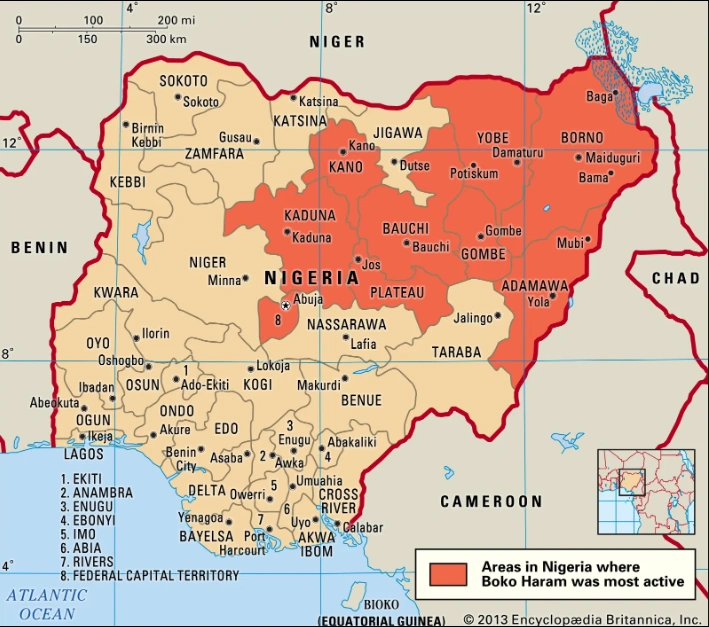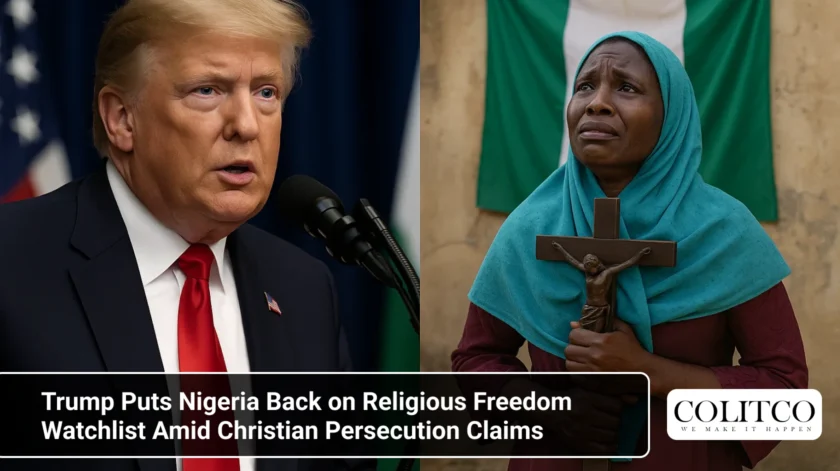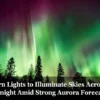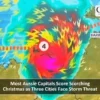President Donald Trump has placed Nigeria back on America’s list of worst religious freedom violators. The Friday announcement has sparked debate about violence, geopolitics, and whether sanctions will follow.
The designation marks a reversal of Biden-era policy and positions Nigeria alongside China, Russia, and North Korea on the State Department’s Countries of Particular Concern list.
What Trump Actually Said
“Christianity is facing an existential threat in Nigeria,” Trump wrote on Truth Social. He claimed thousands of Christians are being killed and blamed radical Islamists for the violence.
The president directed Republican congressmen Riley Moore and Tom Cole to investigate and report back with recommendations. Trump framed the move as defending Christians worldwide.
Nigeria’s government has rejected the claims outright.
“The United States cannot stand by while such atrocities are happening in Nigeria, and numerous other Countries. We stand ready, willing, and able to save our Great Christian population around the World!” – PRESIDENT DONALD J. TRUMP pic.twitter.com/jvWcJmUPJ7
— The White House (@WhiteHouse) October 31, 2025
The Numbers Behind the Controversy
Congressional data paints an alarming picture. More than 7,000 Christians have been killed in Nigeria during 2025 alone, averaging 35 deaths daily. Over 100 pastors and priests have been kidnapped for ransom this year.
Open Doors, an international watchdog group, reports nearly 70 percent of all Christians killed for their faith worldwide last year were in Nigeria.
Violent incidents have hit churches during services. In June, militants attacked a bishop’s village days after he testified before Congress about persecution, leaving more than 20 people dead.
Yet the full story is more complex. Analysts note that while Christians are targeted, the majority of armed group victims are Muslims in Nigeria’s Muslim-majority north.

Map showing areas affected by Boko Haram and related violence in Nigeria.
How the Law Actually Works
The International Religious Freedom Act gives presidents power to designate violator countries. But designation doesn’t automatically trigger penalties.
The law requires consultation and negotiations before sanctions kick in. Presidents can waive sanctions citing national security interests.
History shows enforcement is rare. Out of 164 CPC designations since 1998, only three new sanctions have been imposed, all against Eritrea.
Many countries simply ignore the label through diplomatic workarounds.
Nigeria’s Complicated History on the List
Trump first placed Nigeria on the CPC list in 2020. The Biden administration removed it in 2021, citing resource conflicts rather than religious targeting.
The initial designation did not single out attacks on Christians. Nigeria joined the list for broader “systematic violations of religious freedom.”
The removal came ahead of then-Secretary of State Antony Blinken’s Nigeria visit. Critics called it diplomatic calculation over principle.
Congressman Moore has championed Nigeria’s redesignation since entering Congress. He introduced legislation in July specifically highlighting Christian persecution.
Who’s Actually Doing the Killing
Three main groups drive the violence:
- Boko Haram – The longest-running Islamist insurgency in Nigeria’s northeast
- ISIS-West Africa – A splinter group with ties to the Islamic State
- Fulani militants – Herders involved in farmer conflicts that often have religious dimensions
The violence concentrates in Nigeria’s Middle Belt and northern regions. Survivors describe gunmen shouting “Allahu Akbar” while torching churches and homes The Bullet.
Security forces have failed to stop the attacks. Some reports suggest elements within Nigeria’s government may be complicit.
What Nigeria Says
Nigerian officials strongly dispute claims of systematic Christian targeting.
Information Minister Mohammed Idris recently told media that persecution claims are “very misleading.” Presidential spokesperson Bayo Onanuga insists Christians aren’t specifically targeted.
“We have religious harmony in our country,” Onanuga said, dismissing U.S. congressional estimates that 50,000 Christians have been killed since 2009.
The government points to Muslim victims of the same violence as evidence the crisis isn’t religious.
What Happens Next
Trump has given Moore and Cole a mandate to investigate. Their findings will shape whether actual sanctions follow.
Possible U.S. actions include:
- Restrictions on security assistance
- Arms sales suspension
- Economic sanctions
- Travel bans on officials
- Asset freezes
Nigeria’s strategic importance complicates enforcement. The country is Africa’s largest oil producer and most populous nation.
The U.S. has avoided harsh measures before due to Nigeria’s geopolitical significance and counterterrorism cooperation needs.
The Broader African Context
The White House has acknowledged a surge in anti-Christian violence across sub-Saharan Africa, where jihadist movements exploit political instability and porous borders.
Christian advocacy groups are pressing for action beyond symbolic gestures. They argue naming and shaming without consequences emboldens persecutors.
International Christian Concern President Shawn Wright called Trump’s move “a significant step toward mobilising the global community.”
Thank you @POTUS for your incredible leadership by designating Nigeria as a Country of Particular Concern.
You have always been a champion for Christians around the world, and I’m grateful for the opportunity to work with you and Chairman Cole @houseappropsgop to defend our… pic.twitter.com/BOA9UnszzV
— Rep. Riley M. Moore (@RepRileyMoore) October 31, 2025
Questions That Remain
Is this primarily religious persecution or resource conflict with religious dimensions? Experts disagree.
Will Trump follow through with sanctions or use the designation for diplomatic leverage? Past presidents rarely moved beyond the label.
Can Nigeria’s security situation improve without addressing root causes of farmer-herder conflicts, poverty, and governance failures?
The answers will emerge as congressional investigators examine the evidence and Trump decides his next move.
For now, Nigeria joins an infamous list that includes some of America’s top adversaries. Whether that changes anything on the ground remains to be seen.
Also Read: AGL Energy Seals $185 Million Siemens Turbine Deal
Frequently Asked Questions
Q: What does Country of Particular Concern mean?
A: It’s a designation under the International Religious Freedom Act for countries that engage in or tolerate severe violations of religious freedom. The label can lead to sanctions but doesn’t automatically trigger them.
Q: How many Christians have been killed in Nigeria?
A: Congressional data shows more than 7,000 Christians killed in Nigeria during 2025 alone. Estimates since 2009 range from 50,000 to 100,000, though Nigeria disputes these figures.
Q: Can Trump impose sanctions on Nigeria?
A: Yes, but it requires additional steps. The president must consult Congress and can choose from various penalty options or issue a waiver citing national security interests.
Q: Who are the main groups attacking Christians in Nigeria?
A: Boko Haram, ISIS-West Africa, and Fulani militants are primarily responsible for violence against Christian communities in northern and central Nigeria.
Q: Why did Biden remove Nigeria from the CPC list?
A: The Biden administration argued violence stemmed primarily from resource conflicts rather than religious targeting. Critics called it a diplomatic decision ahead of high-level visits.












